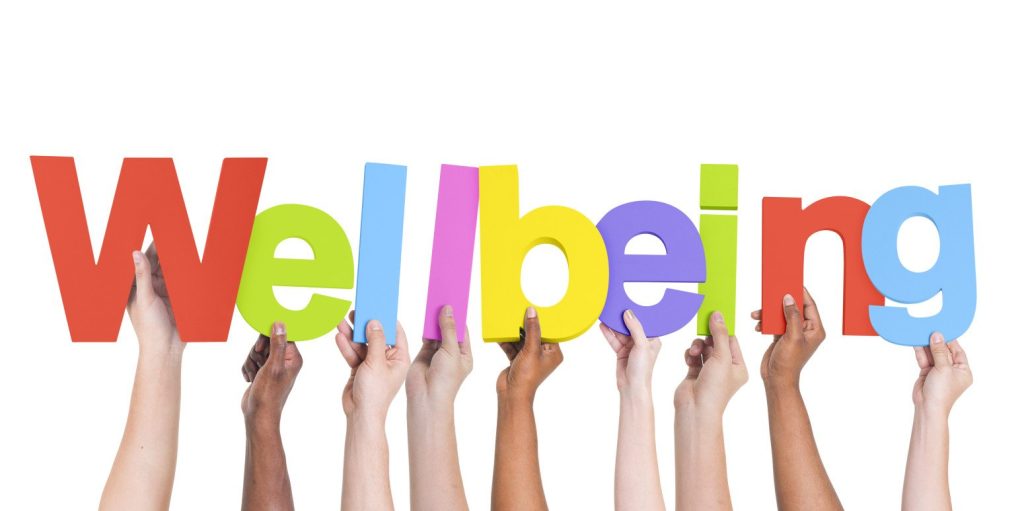Contents
- 1 What Is Well-being?
- 2 Importance Of Well-being
- 3 Types Of Well-being
- 4 Ways To Ensure Well-being
- 4.1 Create a morning ritual
- 4.2 Write in a journal
- 4.3 Practice self-care
- 4.4 Visualize feeling good
- 4.5 Socialize With Others
- 4.6 Ask For help
- 4.7 Remember you’re important
- 4.8 Get enough sleep
- 4.9 Exercise
- 4.10 Meditate or practice mindfulness
- 4.11 Eat healthy food
- 4.12 Get enough sunlight
- 4.13 Use your strengths every day
- 4.14 Surround yourself with supportive people
- 5 How To Take Care Of Others?
- 6 Conclusion
- 7 A Word From Therapy Mantra
What Is Well-being?

Different people have different ideas of what ‘well-being’ means to them. There are some things that are universally beneficial, but there are many other factors that can affect how you feel day today. This article will talk about the importance of well-being for yourself and for others!
When it comes to well-being, there is no one-size-fits-all definition. Everyone has their own unique idea of what makes them feel good and fulfilled. However, there are some general characteristics that are often associated with well-being. These can include feeling happy, content, and satisfied with your life, as well as having a sense of purpose and meaning.
Importance Of Well-being
 The importance of well-being cannot be overstated! It is essential for both our individual happiness and for the positive impact we can have on the world around us. Taking care of ourselves is one of the most important things we can do to nurture our well-being.
The importance of well-being cannot be overstated! It is essential for both our individual happiness and for the positive impact we can have on the world around us. Taking care of ourselves is one of the most important things we can do to nurture our well-being.
There are many ways to do this, from getting enough exercise and sleep to eating healthy food or taking steps to better manage stress. You’ll know it’s time to take care of yourself when you’re feeling tired, run-down, overwhelmed, or burnt out.
It can be hard to step back and ask for help, but this is one of the best ways to actually take care of yourself! When we feel good about ourselves and are living the life we want to be living, it is much easier to feel empathy for others.
It can be easy to dismiss someone else’s struggles when you are struggling yourself—but being supportive and kind to one another is an important part of feeling connected and fulfilled. When you think about the people around you, what qualities come to mind? Do they feel cared for and loved by the people in their lives? If you can’t think of anyone who is receiving support, ask them!
Types Of Well-being
There are many different types of well-being, and each one is important in its own way! Here are a few of the most common types:
1. Physical well-being
Physical well-being is about taking care of your body and ensuring that you are healthy and strong. This includes eating healthy food, getting enough exercise, and getting enough sleep.
Physical well-being is something that anyone can work on. Even if you don’t currently enjoy exercise, you might find that you like it once you give it a try! Try starting with something small (like taking the stairs at school or work) and building from there.
2. Emotional well-being
Emotional well-being has to do with how we manage our emotions in healthy ways. This includes not suppressing difficult emotions, but also not acting impulsively when we are upset about something.
Emotional wellbeing is important because it allows us to live fulfilling lives without being overly influenced by momentary feelings of sadness or anger, for example. If you have trouble managing your emotions in healthy ways, mindfulness can be really helpful
2. Mental well-being

Mental well-being is about taking care of your mind and making sure that you are in a good place emotionally. This includes managing stress, practicing self-care, and engaging in activities that make you happy.
Mental well-being is often talked about in conjunction with mental health. However, it’s important to recognize that you can have a great life without being “mentally healthy” 100% of the time. Mental well-being is more complicated than just feeling happy and fulfilled—it also includes having good coping strategies so that you can deal with your emotions in a healthy way! This might sound overwhelming at first, but learning to cope doesn’t take much time or effort.
3. Spiritual well-being
Spiritual wellbeing has to do with finding meaning and belonging through spiritual practices like meditation or prayer. This type of self-care is often associated with religion, but it doesn’t have to be! If you practice mindfulness, setting aside a few minutes each day to be still and observe your thoughts can strengthen your spiritual wellbeing.
Spiritual well-being is important because it helps us understand ourselves and our place in the world. This type of self-care can take many forms, such as attending religious services or spending time outside in nature. Regardless of how you practice this form of wellness, regular meditation can help you gain clarity and connection with yourself!
4. Social well-being

Social well-being has to do with how we interact with others and make connections through meaningful relationships. This includes not only our closest friends and family members but also acquaintances and people we wouldn’t typically consider part of our social circles (like classmates).
Social wellbeing is important because it allows us to feel supported and loved by the people around us. If you have trouble connecting with others or making friends, try joining a club or hobby group. A good first step might be trying out some new activities that interest you!
5. Environmental well-being
Environmental well-being has to do with taking care of the planet and living sustainably. This includes recycling, using less water and electricity, and protecting animal habitats.
Environmental wellbeing is important because it ensures that future generations will have access to beautiful places like parks, oceans, forests … even farmlands! Start working on environmental self-care by doing something small every day—like turning off the lights when you leave a room or reusing plastic bags. If you’re eager to make a bigger impact, consider switching to renewable energy sources like solar power!
Ways To Ensure Well-being

You should always take care of yourself and ensure that you are well in all aspects. These are some things you can do-
Create a morning ritual
Create a morning ritual that nurtures yourself physically, spiritually, and emotionally. This could include taking a warm shower, practicing yoga or meditation, stretching your body as you drink your coffee or tea, putting on your favorite outfit before you leave the house, or making breakfast for yourself.
Write in a journal
Write in a journal every day. Taking time to reflect and record your thoughts can help you process difficult emotions and let go of negative ones from the previous day. Keeping a journal also makes it easier to track positive changes and notice areas of growth over time!
Practice self-care
Practice self-care at least once per week (and whenever you need it). Self-care doesn’t have to be fancy; things like massages or bubble baths can be great, but they aren’t for everyone. Sometimes the best self-care is about taking time to engage in activities you enjoy (like listening to music, watching your favorite TV show, doing something creative), while not giving yourself any pressure to do anything else!
Visualize feeling good

Spend some time thinking about how you want to feel in your life and the types of people you want in your life. This might include qualities like being calm, confident, optimistic, peaceful, relaxed, excited about things that are coming up—or it might just mean feeling truly happy with who you are. Taking the time to visualize what “feeling good” looks like for you can be very motivating!
Socialize With Others
Try out different ways of being social in the world. Sometimes when you are struggling to feel well, it can be hard to engage with others. Try things like talking to your neighbor when you see them outside or striking up a conversation at the grocery store with someone you don’t know very well yet. You could even reach out to one person over text, email, or social media and ask them how they’re doing! They might be surprised—but of course, they will be happy too!
Ask For help
Reach out for help if you need it! It is so important that we take care of ourselves and allow ourselves time to heal without putting pressure on ourselves. Remember: no matter how much support we give other people, we all deserve love and care from those around us too! Sometimes we have to reach out and ask for a little love from a friend, family member, or even a professional. You can do it.
Remember you’re important

Remember that you are important and deserve the best care in the world. Even when life is tough (and when you are struggling), try not to forget this one very true thing: your life matters, you matter, and you deserve happiness & joy no matter what. It might be difficult to remember at times—but know that others want this for you too!
Get enough sleep
Getting enough sleep is essential for your physical, mental, and emotional well-being. Sleep for at least 7-8 hours daily to relax your mind and body.
Exercise
Regular exercise is an imperative part of staying healthy, both physically and mentally. It can help reduce stress levels in the body.
Meditate or practice mindfulness
Meditation has been shown to ease depression and anxiety in people who suffer from ongoing mental illness.
Eat healthy food
Food is a powerful way of influencing your mind and body. It’s worth taking the time to buy and prepare healthy, tasty food.
Get enough sunlight
Exposure to natural light can help regulate your body clock and keep you feeling energized throughout the day.
Use your strengths every day
Character strengths indicate the things that you are good at and enjoy doing. Use your personal strengths every day, even if it’s just for a few minutes—you’ll notice a difference!
Surround yourself with supportive people
Find people who make you feel valued and cared for. Don’t surround yourself with people whose attitudes, words, or actions make you feel bad about yourself!
How To Take Care Of Others?

To take care of yourself is taking care of others too. You can do it following these tips-
Do not judge
Listen to what people are sharing with you about their problems without judgment. Go beyond just hearing someone out—actively listen to understand where they’re coming from. If it sounds like they’re asking for advice, ask them if they want you to give any input before offering it up
Be open and honest with each other about your struggles and successes. Communication is a two-way street—both parties need to be willing to share their experiences with each other in order for a relationship or friendship to grow. Empathy is one of the most important values we can hold as humans, so don’t be afraid to reach out if needed!
Listen to them
Asking people how they’re doing and really listening as they respond lets them know that you care about them. Make an effort to do this on a daily basis with those around you!
There is a saying: “To have a friend, be a friend.” This can seem like an intimidating task if you haven’t spent much time cultivating relationships with other people. But there are many ways you can show someone else that they matter, whether or not you’ve known them long! Here are some quick tips for showing compassion to those around you:
Compliment someone
Offering sincere compliments is one of the best ways to let someone know they’re important. It’s easy to catch someone doing something right—but it’s even more meaningful to let them know they are appreciated.
Show empathy
Listening without judgment can make someone feel understood when they are sharing their thoughts and feelings with you. It is important not to jump in when they are talking, but instead, really take in what they are saying. After they have finished speaking, ask them if there was anything else that was on their mind or anything you didn’t understand about what they were trying to express.
Try offering a helping hand

Helping others is not only good for the person receiving help. But it’s also uplifting for the person giving! If someone seems like they could use an extra hand around the house, offer to run errands for them, cook dinner, or just give them a break from their responsibilities.
Offer to keep a secret
Being trustworthy is key in maintaining strong relationships with people. The more you can be open and honest with others about your thoughts and feelings, the stronger connections you’ll build.
Be patient and kind
Everyone has bad days where they just don’t feel like themselves. These days happen to everyone—but that doesn’t mean we should treat ourselves poorly when we’re not at our best. If someone asks how you are doing and you tell them “Not so great,” resist the urge to get defensive if they say something like “Why? What’s wrong?” Be patient and kind with yourself and others around you on tough days—these don’t last forever.
Suggest professional
Suggest professional help if needed When someone comes to you for emotional support, it’s okay (and sometimes necessary) to suggest professional help if needed. Depression and anxiety can be treated through
they’re asking for advice, ask them if they want you to give any input before offering it up
Ask before giving your opinion
If you want to give advice, make sure the other person has asked for it. Otherwise, they may not actually be interested in hearing what you have to say.
Be open and honest with each other about your struggles and successes. The best way to show someone you care is by actually telling them! Take the time to reach out and let those around you know they matter—they’ll be thankful you did…
Conclusion
Taking care of your well-being and supporting those around you are incredibly important ways that we can take care of our well-being on an individual basis. You can speak to someone around you about ways that they might be able to deal with feelings of depression or anxiety. If you are feeling depressed, there is never any shame in asking for help—whether it’s talking to a friend, family member, or health professional. You deserve all the love and support in the world.
Taking care of your physical well-being and mental health is incredibly important. That’s why we created our Mental Health Resource Center, where we share articles, videos, tips, and more that can help promote positive mental health for people all over the world.
A Word From Therapy Mantra
Your mental health — Your psychological, emotional, and social well-being — has an impact on every aspect of your life. Positive mental health essentially allows you to effectively deal with life’s everyday challenges.
At TherapyMantra, we have a team of therapists who provide affordable online therapy to assist you with issues such as depression, anxiety, stress, workplace Issues, addiction, relationship, OCD, LGBTQ, and PTSD. You can book a free therapy or download our free Android or iOS app.


